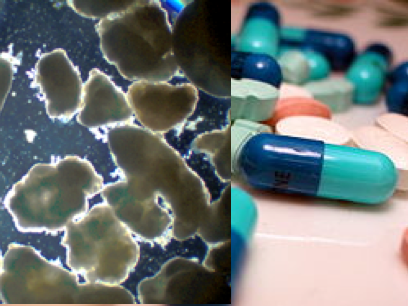Vi ger ut 8-9 nyhetsbrev varje år med aktuella händelser inom VA-teknik Södra: reportage, forskningsprojekt, publikationer, events, nytt om namn och tips om spännande saker på gång. Publicerade/tidigare nyhetsbrev kan du läsa här.
In wastewater micropollutants, such as pharmaceuticals, exist in trace concentrations. It is well known that many of them are  harmful to aquatic organisms and wastewater treatment plants will most probably face regulations in the future regarding the reduction of such compounds. Hence, wastewater treatment plants need to be rebuilt for advanced techniques. Many of these compounds are unaltered or partly degraded in the wastewater treatment plant, and some have a tendency to adsorb to the sludge. Advanced treatment including nutrient removal where solids retention time is longer has been found to increase the degradability of these compounds. The overall aim of this project is to increase the understanding for how micropollutants are removed in novel, advanced biological wastewater treatment processes. In this project the removal of these compounds will be studied in both aerobic granular and floccular activated sludge as well as in biofilm on moving carriers. The removal mechanisms and degradation kinetics will be assessed.
harmful to aquatic organisms and wastewater treatment plants will most probably face regulations in the future regarding the reduction of such compounds. Hence, wastewater treatment plants need to be rebuilt for advanced techniques. Many of these compounds are unaltered or partly degraded in the wastewater treatment plant, and some have a tendency to adsorb to the sludge. Advanced treatment including nutrient removal where solids retention time is longer has been found to increase the degradability of these compounds. The overall aim of this project is to increase the understanding for how micropollutants are removed in novel, advanced biological wastewater treatment processes. In this project the removal of these compounds will be studied in both aerobic granular and floccular activated sludge as well as in biofilm on moving carriers. The removal mechanisms and degradation kinetics will be assessed.
The project is divided in two parts:
Part 1: Studies of adsorption mechanisms in aerobic granular sludge, activated sludge and biofilm on carriers. Granular sludge and activated sludge is cultivated under controlled environmental conditions in the laboratory. Biocarriers from different parts of the plant (from post-denitrification, post-nitrification, partial nitrification/anammox processes) is taken from the local wastewater treatment plant (Gryaab). The different biomasses are exposed to a range of pharmaceuticals with different properties for a few hours. Samples for analysis of the pharmaceuticals are taken during the experimental run and the degree of adsorption is assessed. The pharmaceuticals will be analysed in collaboration with the Technical University in Denmark (DTU).
Part 2:A laboratory-scale sequencing batch aerobic granular reactor will be spiked with the different pharmaceuticals and the removal will be assessed by analysing the effluent concentrations. The removal and degradation kinetics will be assessed.
For further information contact:
Professor Britt-Marie Wilén, 072 387 6419, britt-marie.wilen@chalmers.se
PhD candidate Cecilia Burzio, 0317726925, burzio@chalmers.se
Vi ger ut 8-9 nyhetsbrev varje år med aktuella händelser inom VA-teknik Södra: reportage, forskningsprojekt, publikationer, events, nytt om namn och tips om spännande saker på gång. Publicerade/tidigare nyhetsbrev kan du läsa här.